Business in Southern Africa (Online Bachelor of Science)
Business in Southern Africa (Bachelor of Science in Inter-African Business, e-learning, fourth semester)
| Bachelor of Science in Inter-African Business |
Subject - “Doing Business in Southern Africa” (9 ECTS) - Online Bachelor of Science in Inter-African Business (fourth semester).
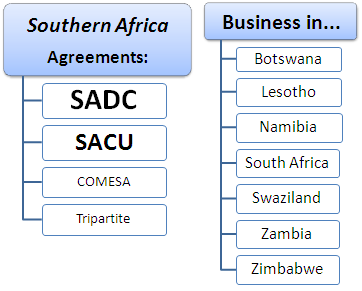
The main objective of the Subject “International Trade and Business in” Southern Africa”, is to offer a global vision of the Southern African markets.
- To learn to do business in South Africa, Botswana, Lesotho, Namibia, Eswatini, Zambia, and Zimbabwe
- To understand the importance of the SADC (Southern African Development Community) and the SACU (Southern African Customs Union)
- To analyze the business opportunities, International Trade and the foreign direct investment in the Southern African Countries
- To know the main Southern African Businessmen
- To know the main ports and Trans-African Corridors of Southern Africa
- To develop a Business Plan for Southern Africa
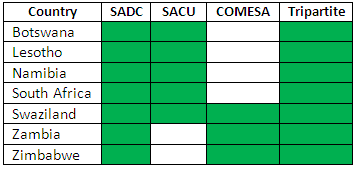

Syllabus of the Program: Southern African Customs Union (SACU).
- Introduction to the SACU: the oldest Customs Union of the World
- Structure of the SACU and their institutions
- Committees of the SADC: agriculture, customs, international trade, industry, transport, and finance
- Economic profile of the SACU region: South Africa, Botswana, Lesotho, Namibia, and Eswatini
- Southern African Customs Union Agreement (SACU) 2002
- Foreign trade facilitation in the SACU region
- Customs Development Program WCO-SACU
- Income management
- Customs Policy
- Common external tariff
- SACU Trade Agreements;
- Agreements under negotiation with the MERCOSUR, EU, the U.S., East African Community, China
- History of the SACU
- Development and Research Policy of the SACU
- Statistics databases of the Southern African Customs Union
Objectives of the Program “Southern African Customs Union (SACU)”:
- To understand the objectives, structure, and committees of Southern African Customs Union (SACU)
- To evaluate the advantages for the member countries of the SACU and the areas of cooperation
- To know the socio-economic context of the countries of the region of Southern Africa
- To analyze the Southern African Customs Union Agreement
- To analyze the programs on trade facilitation and liberalization of the SACU
- To explore the free trade agreements of the SACU
Southern African Customs Union (SACU)-European Free Trade Association (EFTA) Free Trade Agreement.
- Introduction to the SACU-EFTA FTA
- Topics covered in the SACU-EFTA Trade Agreement
- International Trade between the European Free Trade Association (Iceland, Liechtenstein, Norway, Switzerland) and the Southern African Customs Union (Botswana, Lesotho, Namibia, South Africa and Eswatini)
India-Southern African Customs Union (SACU) Preferential Trade Agreement.
- Introduction to the India-Southern African Customs Union (SACU) Preferential Trade Agreement
- International Trade between India and South Africa
European Union-Southern African Development Community (SADC) Free Trade Agreement.
- Introduction to the Free Trade Agreement between the EU and the SADC
- Foreign Trade Liberalization
Syllabus of the Program: Doing Business in Botswana
- Introduction to Botswana
- Economy of Botswana
- Key sectors of the economy:
- Leather
- Pharmaceutical products
- Mining
- Cattle
- International Trade of Botswana
- Trade Agreements of Botswana
- Business in Gaborone
- Invest in Botswana
- Case Study:
- Debswana (diamonds)
- Botswana telecommunications
- Access to the Botswana's market
- Business Plan for Botswana
Objectives of the Program “Doing Business in Botswana”:
- To learn to do business in Botswana
- To know the business opportunities in Botswana
- To investigate trade relations of Botswana with the country of the student
- To know the trade agreements of Botswana
- To learn to develop a Business Plan for Botswana
Syllabus of the Program: Doing Business in Lesotho
- Introduction to Lesotho
- Economy of the Kingdom of Lesotho
- International Trade of Lesotho
- Access to the market
- Customs of Lesotho
- Business opportunities in Lesotho
- Textile sector
- Plastics products
- Leather
- Agribusiness
- Mining
- Energy
- Infrastructure development
- Case Study:
- Lesotho Highlands Water Project
- Textile Industry of Lesotho
- Lesotho National Development Corporation
- Access to the market of Lesotho
Objectives of the Program “Doing Business in Lesotho”:
- To learn to do business in Lesotho
- To know the business opportunities in Lesotho
- To know the trade agreements of Lesotho
- To investigate trade relations of Lesotho with the country of the student
- To learn to develop a Business Plan for the market of Lesotho
Syllabus of the Program: Doing Business in Namibia
- Introduction to Namibia
- Namibian economy
- Namibian Foreign Trade
- Port of Walvis Bay
- Directorate of Customs
- Case Study:
- Free zone of Walvis Bay
- logistic corridors in Namibia: Walvis Bay, Trans-Oranje, Trans-Caprivi, Trans-Cunene
- Tripoli-Windhoek Corridor
- Trade Agreements of Namibia
- Investment opportunities in Namibia
- Access to the Namibian market
- Business Plan for Namibia
Objectives of the Program “Doing Business in Namibia”:
- To learn to do business in Namibia
- To know the business opportunities in Namibia
- To know the trade agreements of Namibia
- To investigate trade relations of Namibia with the country of the student
- To learn to develop a Business Plan for the Namibian market
Syllabus of the Program: Doing Business in Eswatini
- Introduction to Eswatini
- Economy of Eswatini
- Swazi International Trade
- Trade Agreements of Eswatini
- Access to the Swazi market
- Customs of Eswatini
- Fiscal Authority of Eswatini
- Business and Investment opportunities in Eswatini
- Mining
- Tourism
- Manufacture
- Agro-industry
- Company incorporation in Eswatini
- Case Study:
- Royal Swaziland Sugar Corporation
- Tibiyo Taka Ngwane - one of the largest Swazi companies
Objectives of the Program “Doing Business in Eswatini”:
- To learn to do business in Eswatini
- To know the business opportunities in Eswatini
- To know the trade agreements of Eswatini
- To investigate trade relations of Eswatini with the country of the student
- To learn to develop a Business Plan for the Swazi market
- To study the profile of Swazi companies
Syllabus of the Program: Doing Business in Zambia
- Introduction to Zambia
- Business in Lusaka
- Economy of Zambia
- Zambian Foreign Trade
- Customs of Zambia
- Trade Agreements of Zambia
- Business and Investment opportunities in Zambia
- Infrastructures
- Energy
- Agriculture
- Tourism
- Case Study:
- Mining
- Zambeef Company
- Access to the Zambian market
- Business Plan for Zambia
Objectives of the Program “Doing Business in Zambia”:
- To learn to do business in Zambia
- To know the business opportunities in Zambia
- To know the trade agreements of Zambia
- To investigate trade relations of Zambia with the country of the student
- To learn to develop a Business Plan for the Zambian market
- To study the profile of Zambian companies
Monica Katebe Musonda (Zambia)
- The Zambian Businesswoman Monica Katebe Musonda
- The food company Java Foods
Syllabus of the Program: Doing Business in Zimbabwe
- Introduction to Zimbabwe
- Zimbabwean Economy
- Zimbabwean International
- Customs of Zimbabwe
- Business and Investment opportunities in Zimbabwe
- Agriculture
- Manufacture
- Mining
- Tourism
- Energy
- Water and sanitation
- Information and communication technologies
- Finance and insurances
- Services
- Case Study: Businessmen of Zimbabwe
- Divine Ndhlukula
- Sifiso Dabengwa
- Strive Masiyiwa
- Makomo Resources Company
- Access to the market Zimbabwean
- Business Plan for Zimbabwe
Objectives of the Program “Doing Business in Zimbabwe”:
- To learn to do business in Zimbabwe
- To know the business opportunities in Zimbabwe
- To know the trade agreements of Zimbabwe
- To investigate trade relations of Zimbabwe with the country of the student
- To learn to develop a Business Plan for the Zimbabwean market
- To study the profile of Zimbabwean Businessmen
Divine Ndhlukula
- The Zimbabwean Businesswoman Divine Ndhlukula
- The security company SECURICO
Sifiso Dabengwa
- The Zimbabwean entrepreneur Sifiso Dabengwa
- Trans-African telecommunications group MTN
- Role of Sifiso Dabengwa as the director of the largest telecommunication company in Africa (MTN Group)
Strive Masiyiwa
- The Zimbabwean Businessman Strive Masiyiwa
- Econet Wireless Group
Syllabus of the Program: Doing Business in South Africa
- Introduction to South Africa
- His Excellency Nkosazana Dlamini-Zuma
- South African Economy
- Economic profile of the provinces of South Africa
- Business in Johannesburg, The Cape, Durban, and Pretoria
- South African International Trade
- South African ports
- EU-South Africa Agreement
- Business opportunities in South Africa
- Invest in South Africa
- Case Study:
- Automotive sector of South Africa
- Shoprite
- Public companies
- Access to the South African market
- Business Plan for South Africa
Objectives of the Program “Doing Business in South Africa”:
- To learn to do business in South Africa
- To know the business opportunities in South Africa
- To know the trade agreements of South Africa
- To investigate trade relations of South Africa with the country of the student
- To learn to develop a Business Plan for the South African market
- To study the profile of the South African Businessmen
His Excellency Nkosazana Dlamini-Zuma (former president of the African Union Commission)
- South African Nkosazana Dlamini-Zuma
- His role as former president of the African Union Commission (2012-2017)
Syllabus of the Program: South African Businessmen
Patrice Motsepe
- South African Businessman Patrice Motsepe
- Mining Business of Patrice Motsepe
- Motsepe Foundation
Cheryl Carolus:
- South African Businesswoman Cheryl Carolus
- The investment company Petona
Wendy Appelbaum
- South African Businesswoman Wendy Appelbaum
- The investment company WIPHOLD
- The wine group Morgenzon
Rapelang Rabana
- South African Businesswoman Rapelang Rabana
- The telecommunication company Yeigo
Bridgette Radebe
- South African Businesswoman Bridgette Radebe
- The mining company Mmakau
Irene Charnley
- South African Businesswoman Irene Charnley
- The telecommunication company Smile
Cyril Ramaphosa
- South African Businessman Cyril Ramaphosa
- Shanduka Group
- The participation of Cyril Ramaphosa in the largest African telecommunication company: the MTN Group

- ECTS = European Transfer and Accumulation System
- CECT = Credit of Capitalisable and Transferable Evaluation (CAMES)
Samples: Business in Southern Africa (Bachelor of Science in Inter-African Business, e-learning, fourth semester).
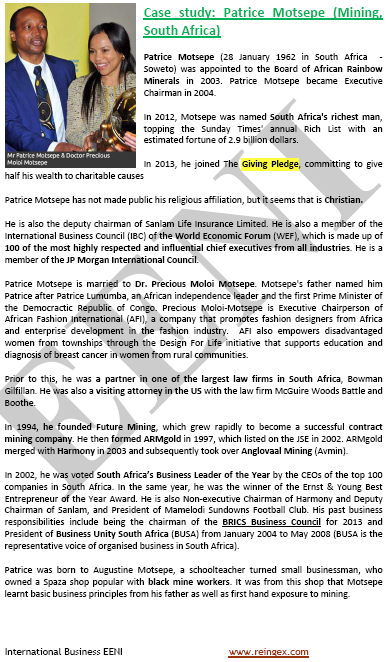
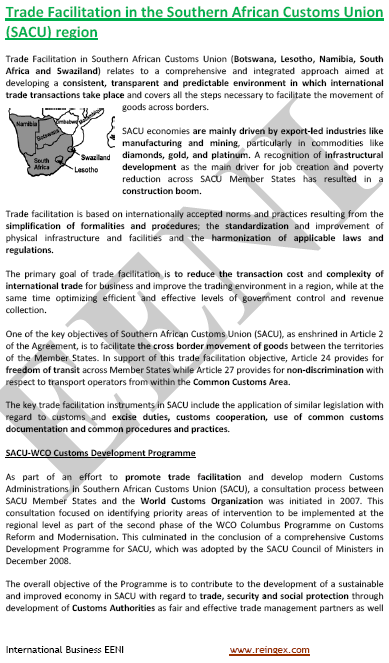

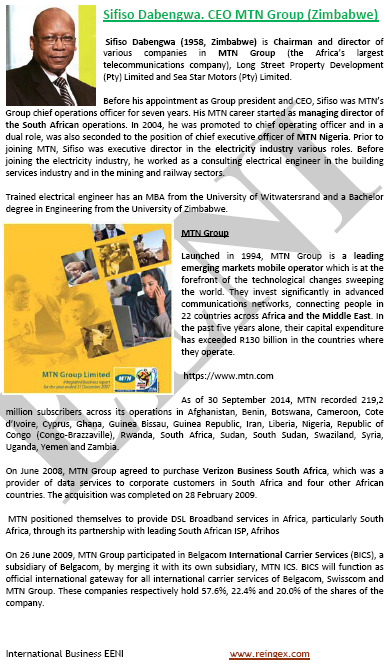
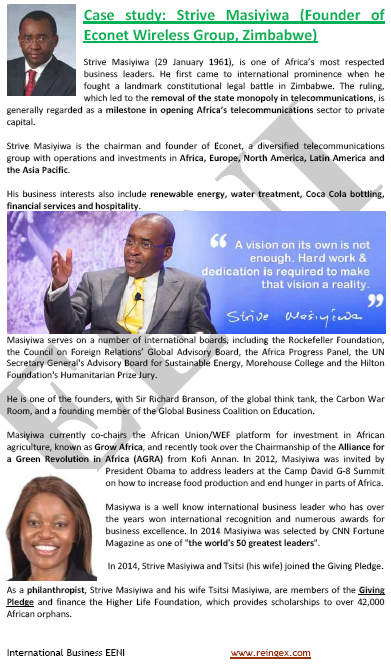
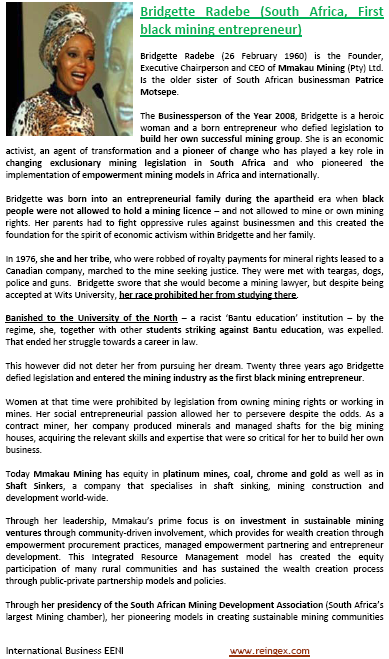
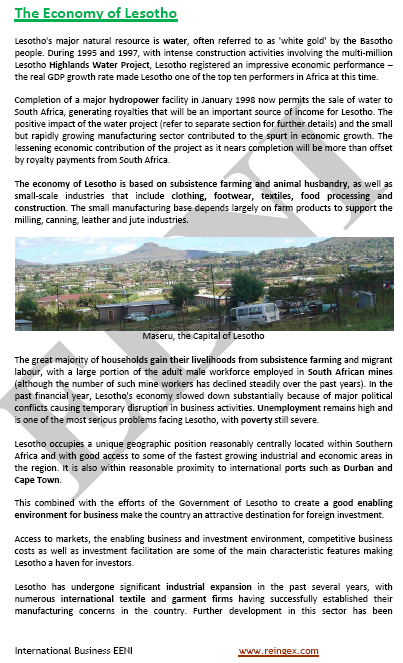
Language of the subject “Business in Southern Africa” of the Bachelor of Science in Inter-African Business taught by EENI Global Business School (fourth semester):
 or
or
 Bachelor of Science en negocios interafricanos
Bachelor of Science en negocios interafricanos  Bachelor of Science en affaires interafricaines
Bachelor of Science en affaires interafricaines  Bachelor of Science em Negócios Interafricanos.
Bachelor of Science em Negócios Interafricanos.
(c) EENI Global Business School (1995-2024)
We do not use cookies
Top of this page

